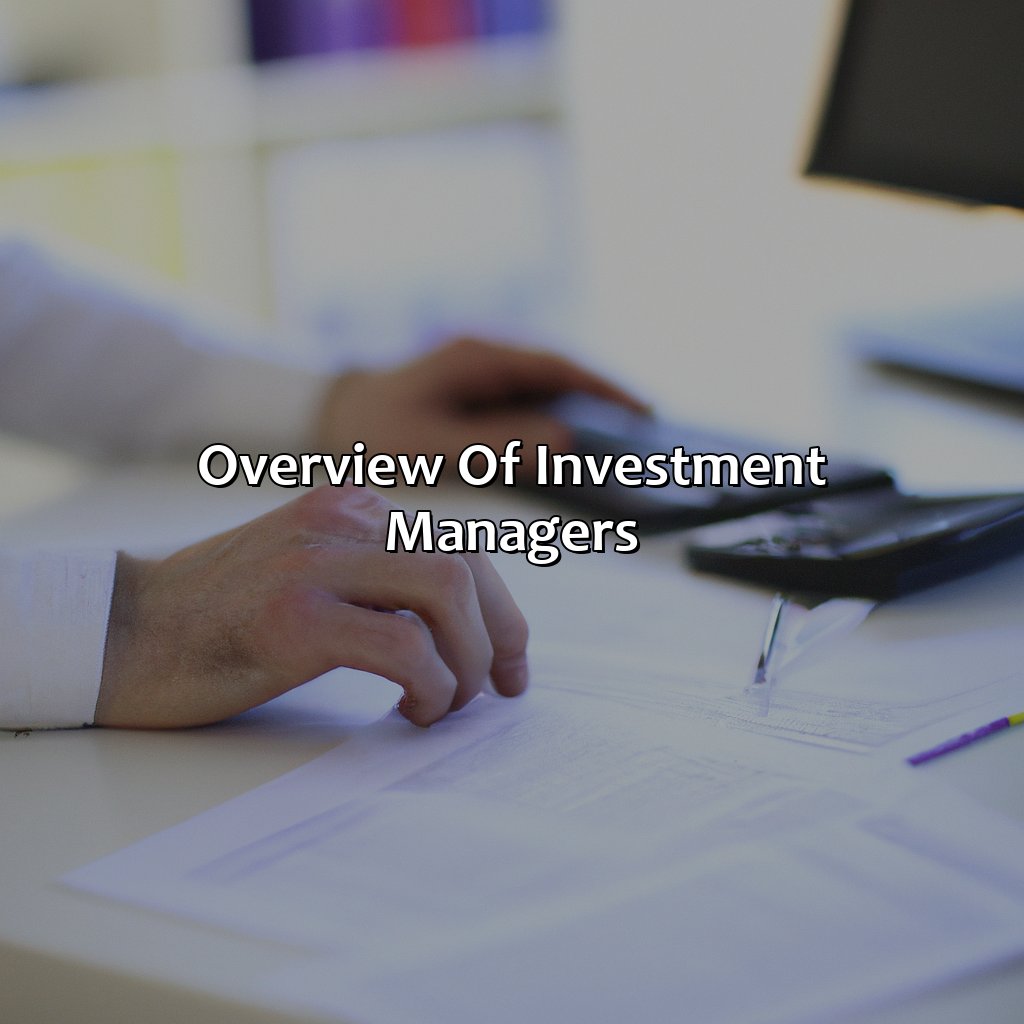What Do Investment Managers Do?
Key Takeaway:
- Investment managers play a crucial role in the management of investment portfolios, helping clients generate returns and reduce investment risks through the use of market analysis, risk management, and portfolio management.
- Effective communication and interpersonal skills are essential for investment managers, as they must build and maintain relationships with clients and other stakeholders while providing investment guidance and insight.
- The future of investment management is characterized by advancements in technology, changes in regulations, and evolving industry trends, which require investment managers to continuously develop their analytical and decision-making skills to remain competitive in the field.
Are you confused about what investment managers do? Learn how to make smart decisions with your money and create financial security with professional investment managers. You’ll soon have the tools to make your money work for you.
Overview of Investment Managers
Investment Managers are responsible for managing investments of individuals or institutions. They analyze financial data, select assets for investment portfolios, and make investment decisions on behalf of their clients. Investment Managers monitor market trends and performance of investments, ensuring portfolio objectives are met. They also communicate and provide recommendations to clients on investment strategies and risk management. With a focus on maximizing returns, Investment Managers utilize their expertise in economics, finance, and portfolio management to deliver results and maintain client trust. A crucial aspect of Investment Management is maintaining a diversified portfolio to mitigate risk and optimize returns.
Pro Tip: Regular portfolio review and adjustment ensure that Investment Managers stay on top of changing market conditions, keeping portfolios optimized for optimal returns.

Image credits: retiregenz.com by Yuval Duncun
Roles and Responsibilities of Investment Managers
It is essential to comprehend the roles and duties of investment managers with portfolio management, risk management, market analysis, and client relationship management as solutions. These divisions let investment managers manage portfolios, reduce risks, inspect market trends, and sustain great relations with clients. Let’s explore each part in detail to recognize their value in investment management.

Image credits: retiregenz.com by Joel Arnold
Portfolio Management
Investment Managers operate ‘Asset Allocation‘ and proactively analyze and modify investment portfolios to maximize returns for clients. Portfolio Management includes regular reviews of market trends and risk analyses to make informed decisions. They align their client’s financial objectives with viable investment options while maintaining compliance with regulations and the client’s risk tolerance. The targeted outcomes are achieving profit, liquidity, capital preservation, diversification, low costs and tax efficiency.
Pro tip: Identify your portfolio’s unique requirements based on your financial goals and take steps to reassess them regularly.
Managing risks is like playing Jenga – you carefully remove the unstable blocks while praying the tower doesn’t come crashing down on you.
Risk Management
Investment managers play a crucial role in managing the potential risks associated with investments to achieve better returns with minimal losses. They employ various techniques to identify, assess and manage the risks in their investment portfolios. By effectively employing diversification, hedging, and monitoring strategies they seek to mitigate risks related to market volatility, creditworthiness, liquidity, and operational factors. Through this process of risk management, investment managers ensure that they maximize returns while minimizing overall exposure and loss potential.
To manage risks effectively, investment managers need to stay up-to-date with market trends and events that may impact the performance of their portfolios. They monitor market fluctuations closely and take necessary actions to mitigate unexpected outcomes by changing the composition or weighting of their investments. Investment managers also keep an eye on emerging risks that may arise from macroeconomic factors such as interest rates or shifts in policy by regulatory authorities.
In managing risk for clients’ investments, investment managers need to take due diligence seriously by conducting thorough research before making any decisions. By closely analyzing financial statements, reports on company performance, industry trends, economic indicators and more; investment managers can put together a detailed plan for each portfolio’s individualized needs.
An important part of risk management is assessing one’s own success stories as well as failures over time. As an example – a few years ago there was major pull-back on large businesses due to intrinsic issues – this stranded many fund managers who were solely exposed towards them but few other individuals who had diversified their portfolios were able to weather out through this storm. Investment managers constantly learn from these experiences about how they can protect themselves against future occurrences while seeking higher returns within reasonable levels of risk tolerance.
Market analysis is like being a detective – you have to sift through all the clues and evidence to figure out who’s guilty of making the big bucks.
Market Analysis
Analyzing Market Trends and Investment Opportunities is a vital part of the investment manager’s role.
Here is a breakdown of the data that may be included in a Market Analysis Table: market size, competition, economic indicators, technological advancements, social trends, environmental factors, political climates, and consumer behavior.
This information provides insight into the viability of potential investments and helps managers make informed decisions for their clients.
Make sure not to miss out on significant investment opportunities- understand your responsibilities as an investment manager today.
If investment managers were therapists, client relationship management would be their couch time.
Client Relationship Management
As investment managers, it is essential to establish and maintain strong connections with our clients. Building and maintaining effective relationships is crucial in ensuring client satisfaction and trust. This involves managing communication, regularly providing performance updates, addressing concerns and answering inquiries promptly.
To manage client relationships effectively, we must listen attentively to their needs and objectives while providing personalized solutions accordingly. The investment manager-customer relationship should ideally be more of a partnership where both parties work towards achieving financial success.
Investment managers must also continuously study the market trends to identify profitable opportunities for clients proactively. We must emphasize transparency, professionalism, and integrity when dealing with clients as this builds a reputation for trustworthy service delivery.
Get ready to whip out the old degree certificate, because being street smart won’t cut it as an investment manager.
Required Skills and Qualifications for Investment Managers
Acing the field of investment management requires certain skills and qualifications. Let’s explore them! These include:
- Education and Certifications
- Analytical and Decision-Making Skills
- Communication and Interpersonal Skills
These are the keys to success in this subject.

Image credits: retiregenz.com by James Arnold
Education and Certifications
The necessary qualifications and credentials required for investment management positions are rooted in obtaining higher education degrees and certifications. Investment managers must hold a functional knowledge of finance, including financial analysis, accounting, economics, and statistics.
Building on this knowledge base, holding professional designations such as CFA (Chartered Financial Analyst), CFP (Certified Financial Planner), Series 7 or 63 licenses demonstrates a deeper level of comprehension within the field. These skill sets are vital for investors to make knowledgeable decisions on behalf of their clients.
The industry is seeking candidates with advanced degrees such as MBA or MS in Finance or Business Administration. Such programs provide students with varied coursework covering equity markets, alternative investments strategies and portfolio management. They may also have the opportunity to learn from seasoned professionals during internships or mentorship programs.
Investment management has a long history dating to European banks in the early 1800s. With a continuously evolving financial landscape and increased regulatory oversight since 2008 crisis, current skills expectation from investment managers have expanded beyond conventional ideas of just acquiring profits while advocating for ethical business practices.
An analytical mind is key for investment managers, because let’s face it, they need to be able to spot a good investment opportunity from a bad one, otherwise they might as well be throwing darts blindfolded.
Analytical and Decision-Making Skills
As an Investment Manager, possessing a deep understanding of data analysis and showing quick decision-making abilities is crucial. An adeptness to deliberate based on numbers and conclude with a well-supported outcome are quintessential to this field.
Financial operations require precise analysis and swift evaluations which are enabled through intricate forecasting techniques. This means that prioritizing critical thinking, hypothesis development, interpretation skills, and analyzing results for meeting the investment goals becomes obligatory.
To thrive in this field, attention to detail during fact-finding process is essential along with executing due diligence while evaluating new opportunities. Notably, advanced knowledge on financial modeling software like Power BI also proves highly advantageous.
As an aspiring Investment Manager who wants to excel in the field of finances while holding a position where your analytical skills are paramount assets, keeping yourself updated of industry trends and new market developments can give you an edge over competitors. Therefore, act proactively by increasing your knowledge base through reading reports & journals and attaining additional certifications in financial analytics.
By setting measurable goals that cater to your growth objectives and working towards them persistently, you can emerge as a successful Investment Manager in future years.
Good communication and interpersonal skills are key for investment managers, because you can’t just scream ‘buy’ or ‘sell’ at your clients like a toddler having a tantrum.
Communication and Interpersonal Skills
Effective Communication and Interpersonal Abilities are critical attributes for Investment Managers. These professionals must interact with investors, stakeholders, clients and colleagues to inform them about market trends and specific investments. Moreover, they should convey data in understandable terms that facilitate decisions and build confidence in investors.
Investment Managers require excellent Communication Skills to collaborate with people at various levels within an organization. They need to demonstrate the ability to gather information effectively through active listening and take feedback that enables them to adapt their strategies.
Additionally, Interpersonal Skills such as Persuasion, Leadership and Motivation help investment managers to influence others’ behaviour positively. It is essential to communicate goals and objectives effectively by establishing a common ground between individuals to produce effective results towards a mutual objective.
According to Harvard Business Review research published recently, strong communication skills significantly impact promotion outcomes at work when combined with technical abilities.
Without investment managers, your portfolio would be like a ship without a captain – lost at sea with no direction or strategy.
Importance of Investment Managers
Gaining an understanding of the significance of investment managers in creating returns, reducing risks, and presenting guidance and insights necessitates delving into their roles and abilities. Investment managers are instrumental in handling investment portfolios and boast expertise in research, analysis, and strategic planning. This section investigates the advantages of investment managers and their capabilities in giving returns to customers, cutting down investment risks, as well as granting investment direction and understanding.

Image credits: retiregenz.com by Yuval Arnold
Generating Returns for Clients
Investment managers play an essential role in generating profits for their clients by utilizing unique investment strategies. They aim to surpass industry benchmarks and identify potential opportunities in the market to maximize returns for investors with a long-term focus.
In doing so, they conduct thorough research on various asset classes, such as equities, bonds, and alternative investments. They also monitor market trends and leverage their expertise to make informed decisions in uncertain economic conditions. By pursuing diversified portfolios with appropriate risk-reward ratios, investment managers can achieve consistent growth over time.
Moreover, investment managers provide personalized advice and guidance to their clients based on their individual needs and investment goals. They help clients navigate complex financial situations and tailor portfolios according to their preferences while ensuring a disciplined approach towards investing.
Ultimately, seeking the expertise of investment managers can empower individuals to reach their financial goals while mitigating risks associated with investing alone.
“Don’t miss out on potentially lucrative opportunities in the chaotic market; Trust professional investment managers for solid returns that stand the test of time.”
Taking investment risks without a manager is like walking through a minefield blindfolded, with a pogo stick for balance.
Reducing Investment Risks
Investment managers play a crucial role in mitigating potential financial hazards related to investment. They are responsible for safeguarding their clients’ interests by analyzing, identifying, and minimizing these risks through sound decision-making and allocation of resources.
The process of reducing investment risks involves diversification across various market segments and asset classes that have traditionally performed well despite the market’s volatility. Investment managers help by actively seeking opportunities to distribute investors’ capital among different securities, such as stocks, bonds, and mutual funds.
By combining traditional analysis with nontraditional techniques like machine learning and artificial intelligence (AI), investment managers can also predict unexpected shifts in the market allowing them to take preemptive steps to minimize associated risks.
Although there’s no guarantee that a portfolio without risk is attainable, hiring an investment manager can increase your chances of securing steady returns on your investments while minimizing potential losses. Don’t miss out on this important service that could have long-lasting benefits for your financial future.
Putting your financial future in the hands of an investment manager is like playing a game of trust fall with your money.
Providing Investment Guidance and Insight
Investment managers play a vital role in providing personalized financial solutions that cater to clients’ individual needs. They offer Investment Guidance and Insight into various investment opportunities, taking into account risk tolerance, financial goals and market conditions. By evaluating the financial landscape, investment managers take informed decisions on behalf of clients, thereby reducing the impact of volatile markets.
Furthermore, investment managers help their clients build diversified portfolios that maximize returns while minimizing risks. They evaluate past performance metrics and assess potential investments based on fundamental analysis and other research techniques. By monitoring portfolio performance and adjusting investment strategies accordingly, they ensure that their clients’ funds are invested in the most profitable ventures.
Pro Tip: It is essential to entrust your finances to an experienced Investment Manager who understands current market trends and can navigate complex investment scenarios prudently. Why trust your investments to a crystal ball when you can have an investment manager with a 401(k) plan?
Future of Investment Management
Investment managers need to take a look at the advances in tech, changes in regulations and new trends in the industry. This will help understand the future of investment management.
Solutions are offered in these sub-sections to assist in navigating the ever-changing landscape.

Image credits: retiregenz.com by Yuval Duncun
Advancements in Technology
The continuous evolution of technology is shaping the future of investment management. With the advent of AI and machine learning, investment managers can now utilize more sophisticated algorithms and data processing techniques to perform market analysis and financial forecasting. These advancements provide cutting-edge tools to help deliver better investment performance.
Investment firms leverage technology to automate trading processes, improve portfolio diversification with greater accuracy, and provide a streamlined customer experience. Innovative robo-advisors powered by AI are disrupting traditional investment management approaches while lowering fees and improving investor outcomes.
In addition to automation, blockchain technology offers tamper-proof ledgers that enable trustful record keeping for complex securities transactions. This transparent ledger mechanism adds another layer of security which may reduce fraud in multiple layers across the entire industry.
Investment firms exploring these technological advancements, will stay ahead in a competitive market while maintaining an edge over their peers who haven’t adopted this technique yet. Not embracing these technological advancements could lead to opportunities missed or worse – eroding market share that’s quickly being absorbed by challengers incorporating modern tech into their operations.
Investing in advanced technologies aligns with customer wants, boosts efficiency reduces dependence on manual work – ultimately leading towards high-quality output for investors as well as companies using it such as banks, hedge funds, Asset Management firms seeking growth via innovative means.
Regulations change faster than a stock market crash, but investment managers always find a way to stay ahead of the curve.
Changes in Regulations
Regulatory Transformations in Investment Management
As the investment management sector swiftly transforms into a data-driven and automated era, regulatory frameworks and supervisory standards surrounding funds and their operators are also adapting. In essence, the unification of regulations across nations and regions has brought forth a significant shift in investment oversight.
With the emergence of digital solutions to traditional challenges, regulators have cautiously taken measured steps to keep up with rapidly developing technologies being used by funds and managers alike. These efforts have been aimed at enhancing market efficiency while maintaining harmonious investor protection standards.
To stay ahead of regulatory changes, investment managers can integrate technology-driven compliance monitoring tools into their operations. By doing so, they can reduce operational risks and enhance compliance accountability. Additionally, staying informed on regulatory changes across different markets enables them to provide their clients with up-to-date information regarding fund activity rules- thus improving mutual accountability for both the investors and fund managers.
In summary, as innovation engulfs the investment ecosystem, keeping abreast with changing regulations is essential for any successful portfolio manager or financial advisor seeking long-term relevance in a thriving industry.
Evolving Industry Trends
The investment management industry is experiencing continuous changes in strategies, technologies, and regulations. As the global economy grows, investment managers need to stay up-to-date with evolving trends to stay competitive and provide exceptional services.
To adapt to current market demands, investment managers are shifting from traditional active management towards passive strategies that utilize AI-powered algorithms for analyzing data. These techniques help reduce costs, increase efficiency and enhance performance while minimizing risks.
Moreover, investment managers are focusing on sustainable investing practices by incorporating environmental, social, and governance (ESG) standards into their decision-making processes. In line with this trend, investors demand more transparency and higher ethical standards from companies in which they invest.
Additionally, the development of digital wealth management platforms has allowed easy access for clients to manage their portfolios through self-service options. The growth of robo-advisors has also prompted investment managers to expand their service offerings through partnerships or acquisitions to remain relevant in the market.
Going forward, we suggest that investment managers proactively adopt technological innovations such as blockchain technology that could enable secure transactions and improve data integrity. Additionally, staying abreast of regulatory compliance will be critical for continued success in an ever-evolving industry.
Five Facts About What Investment Managers Do:
- ✅ Investment managers work with clients to invest their money in various financial markets, such as stocks, bonds, and real estate. (Source: Investopedia)
- ✅ Investment managers use their expertise and knowledge of the financial markets to make informed investment decisions on behalf of their clients. (Source: The Balance)
- ✅ Investment managers analyze market trends, economic data, and company financials to determine which investments are most likely to be profitable. (Source: Wall Street Oasis)
- ✅ Investment managers may specialize in a particular type of investment, such as hedge funds, private equity, or mutual funds. (Source: Career Explorer)
- ✅ Investment managers are responsible for monitoring their clients’ investments and making adjustments as needed to ensure they are meeting their financial goals. (Source: Forbes)
FAQs about What Do Investment Managers Do?
What do investment managers do?
Investment managers are responsible for managing investment portfolios on behalf of individuals or organizations. They analyze market trends and economic data to make informed investment decisions that aim to generate returns for their clients.
How do investment managers get paid?
Investment managers typically earn a percentage of the assets they manage, which is known as the management fee. Additionally, some managers may earn performance-based fees if they meet or exceed certain benchmarks for returns.
What kind of investments do investment managers handle?
Investment managers can handle a wide variety of investments, including equities, bonds, commodities, real estate, and alternative investments such as hedge funds or private equity.
What qualifications do investment managers need?
Investment managers usually have a bachelor’s or master’s degree in finance, economics, or a related field. They also typically have experience working in the financial industry and may hold certifications such as a Chartered Financial Analyst (CFA).
Do investment managers guarantee returns?
No, investment managers cannot guarantee returns. The markets can be unpredictable, and there is always a risk of loss when investing. However, investment managers use their expertise and analysis to make informed decisions that aim to generate returns for their clients.
How do I choose the right investment manager?
Choosing the right investment manager depends on several factors, including your investment goals, risk tolerance, and the manager’s track record and fees. It’s important to research and compare different managers before making a decision. You may also want to seek advice from a financial advisor.


